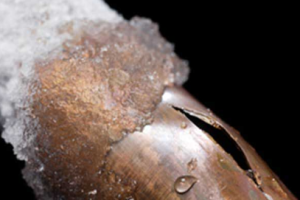
Water-Sewer Manager Eric Carty has reported that calls for frozen pipes have been coming in because of the sub-zero temperatures. Carty recommends that you seal all open spaces or cracks in your house that lead to outside. "Please make sure to check your basement to ensure that all windows, doors and any cracks or spaces open to the outside are sealed to prevent the cold air from freezing your pipes."
The Water Department has some tips on the town website: http://www.hopkintonma.gov/home/government/departments/dpw/water/winter-...
"The Water Department responds to numerous frozen water pipe calls each winter with the majority of them located inside the home. There are several measures that homeowners can take to prevent their water pipes from freezing. The water department would like to offer the following tips.
•First locate your main water shut off valve and meter. You need to check your valve and make sure it works in case of an emergency. It is usually located in your basement on the side facing the street. Insure that the area immediately surrounding the valve and meter is warm enough to prevent freezing. In older homes with fieldstone and rock foundations make sure there are no direct drafts from the holes in the walls or gaps in the windows and doors. If these areas remain cold constantly you should insulate your pipes or wrap them in heating tape. Both of these items can be found in any home improvement store. Remember, even if the room temperature is warm, a direct cold draft on your water pipes, can cause them to freeze!
•In the event that your pipes do become frozen, locate the faucet closest to your main valve and meter. Usually there is one just after the meter. Turn it on to determine if the pipes are frozen in your home or if they are frozen on the street side of the meter. If you have water flow at the point, then the problem is further along the pipe in your home. Try to locate the frozen area by checking subsequent faucets along the way. If there are none, then feel your way across the pipe to find the coldest spot. Once you find the area inspect the pipe to make sure it is not split. Locate the nearest shut off in case you need it. Open the nearest faucet and try thawing the pipe with a hair dryer making sure you slide it from side to side and do not leave it concentrated on one spot. This could cause the pipe to burst. In most cases this should solve the problem. If you are unable to thaw the pipe, you should then contact a plumber. If the problem is on the street side of your meter, you should then contact the Water department.
•If your water has frozen in the past and the problem has not been corrected, you should hire a water department licensed contractor to replace and lower your pipe. Also, do not forget to turn off and drain the supply to your outside faucets and sprinklers. If left on they will freeze and burst.
•To help conserve water during the winter, insulate your hot water pipes. This will help to retain the heat and prevent you from having to run the water in order to get it hot."















